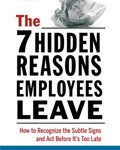 Recently I received a copy of 7 Hidden Reasons Employees Leave by Leigh Branham to review. It was great timing, because I’ve had the “big picture” retention ideas floating through my head in preparation for the HR portion of a leadership retreat at work. This truly was a fantastic book with many great insights, and I can’t list them all here. I’ll hit on some of the high points that really got my blood pumping as an “in the trenches” HR pro:
Recently I received a copy of 7 Hidden Reasons Employees Leave by Leigh Branham to review. It was great timing, because I’ve had the “big picture” retention ideas floating through my head in preparation for the HR portion of a leadership retreat at work. This truly was a fantastic book with many great insights, and I can’t list them all here. I’ll hit on some of the high points that really got my blood pumping as an “in the trenches” HR pro:
- There is a major disconnect with regard to how managers understand retention. According to the research, 89% of managers believe employees leave/stay for money; however, surveys show 80-90% of employees leave for reasons not related to pay (job fit, manager, culture, work environment, etc.)
- In many companies exit interviews are handled by HR. Surely we’re using that opportunity to learn where our weaknesses are and how to manage them, right? Wrong! 42% of HR departments admit their exit interview program isn’t effective.
- One of the key points the author touches on is “push” versus “pull” factors for employees leaving. The “push” factors are internal, and they make the person want to leave. The “pull” factors are mainly external, and they are much less common reasons for leaving. In fact, the author pored over data and developed a list of 57 common, preventable reasons for turnover.Â
- I really liked the part that talked about Allstate Insurance’s “Partnership Statement” for new hires. It’s a great way to make sure that employee/employer expectations are put on the table up front and all parties are clear on their roles from the very beginning. A sampling:
- Allstate: We agree to offer work that is meaningful and challenging, recognize you for your accomplishments, support you in defining career goals, and foster dignitiy and respect in all interactions.
- Employee: You agree to perform at levels that significantly increase the company’s ability to outperform the competition, willingly listen and act upon feedback, take personal responsibility for each transaction with customers and for fostering their trust, and continually improve processes to address customers’ needs
- I couldn’t find where I saw it in the book originally on my second pass through, but the term “talent management malpractice” is one that I’m going to start using to describe horrible talent management practices.
If you’re involved in employee turnover/retention or have a strategic initiative in place to improve those numbers, this book could definitely lend you some great insights for making that happen. You can get your own copy at this link.
Check out other book reviews here.
7 Hidden Reasons Employees Leave
Reviewed by Ben Eubanks on
.
Your employees are leaving-do you know why?
This book gives readers some insight into common reasons employees leave and how to combat them.
Rating: 4
Reviewed by Ben Eubanks on
.
Your employees are leaving-do you know why?
This book gives readers some insight into common reasons employees leave and how to combat them.
Rating: 4
From @beneubanks: 7 Hidden Reasons Employees Leave (Book Review) http://t.co/KJETuf4L
RT 7 Hidden Reasons Employees Leave (Book Review) http://t.co/EIx5jNfb @beneubanks
7 Hidden Reasons Employees Leave (Book Review):
Recently I received a copy of 7 Hidden Reasons Employees… http://t.co/9xkRdVlD
By @beneubanks 7 Hidden Reasons Employees Leave (Book Review) http://t.co/2aBZICZr #TChat #HR
From Upstart HR: 7 Hidden Reasons Employees Leave (Book Review):
Recently I received a copy of 7 Hidden … http://t.co/GXgCZdYf
7 Hidden Reasons Employees Leave (Book Review) http://t.co/MjZwd65T #in
RT @williamtincup: RT 7 Hidden Reasons Employees Leave (Book Review) http://t.co/EIx5jNfb @beneubanks
RT @StarrConspiracy: From @beneubanks: 7 Hidden Reasons Employees Leave (Book Review) http://t.co/KJETuf4L
RT @beneubanks: 7 Hidden Reasons Employees Leave (Book Review) http://t.co/MjZwd65T #in
Reading: “7 Hidden Reasons Employees Leave (Book Review) | upstartHR”( http://t.co/XqZ66pV5 )
From @BenEubanks: 7 Hidden Reasons Employees Leave (Book Review) http://t.co/V1yIKBOX
Upstart 7 Hidden Reasons Employees Leave (Book Review): Recently I received a copy of 7 Hidden Reasons Employees… http://t.co/I9VSJl4B
“@beneubanks: 7 Hidden Reasons #Employees Leave http://t.co/mXLVen38” can’t wait to read! #hr #recruiting #quit
MT @HRConnector via Upstart HR: 89% mgrs think employees leave 4 money but 80-90% leave 4 non-pay related reasons http://t.co/zMn3F1Cy #hr
RT @DoughtyCentre: MT @HRConnector via Upstart HR: 89% mgrs think employees leave 4 money but 80-90% leave 4 non-pay related reasons http://t.co/zMn3F1Cy #hr
@DoughtyCentre @HRConnector via Upstart HR: 89% mgrs think employees leave 4$$$ but 80-90% leave 4 non-pay reasons http://t.co/6oS3V8ja #hr
“80-90% of employees leave for reasons not related to pay (job fit, manager, culture, work environment) http://t.co/gxycdPiK
RT @ptanji: “80-90% of employees leave for reasons not related to pay (job fit, manager, culture, work environment) http://t.co/gxycdPiK
Why you’re getting retention wrong – http://t.co/nDl46FyB #hr #management
RT 7 Hidden Reasons Employees Leave (Book Review) http://t.co/yGgCFifP via @beneubanks @williamtincup
Review of 7 Hidden Reasons Employees Leave from @beneubanks “fantastic book, with many great insights.” http://t.co/aFJuicpw
Pingback: Should You Celebrate When Employees Leave? | upstartHR